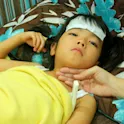
Health
13 Sep 2017
Preventing exercise-induced bronchospasm
Research in Frontiers in Pediatrics identifies the best ways to diagnose, prevent and treat exercise-induced bronchospasm in children with and without asthma.

Health
13 Sep 2017
Research in Frontiers in Pediatrics identifies the best ways to diagnose, prevent and treat exercise-induced bronchospasm in children with and without asthma.

Frontiers news
28 Oct 2016
Frontiers in Pediatrics is thrilled to announce Professor Barbara Ludwikowski (Auf Der Bult Children’Hospital, Hannover) as the new Specialty Chief Editor of the Pediatric Surgery section. In her career as clinical scientist, she has made important scientific contributions to the understanding of urological diseases and genital anomalies in children and infants. As Prof. Ludwikowski emphasizes: “One of the challenges in Pediatric Surgery is the inevitable development of ever more narrow subspecialty areas. While specialization is essential given the constant addition of new knowledge, new diagnostic, treatment modalities and surgical techniques, we should remember what Owen H Wangensteen wrote in his book about the state of general surgery after World War II.” “With the extension of surgery into many new areas since World War II and consequent fragmentation, a more important query confronting surgery today is, can we survive as a unified body? The answer would appear to be free communication between its many disciplines. Tight compartmentalization breeds sterility, the only hope is transpollination, the catalyst of life.” – Wangensteen O, Wangensteen S (1978). The Rise of Surgery. From Empiric Craft to Scientific Discipline. Minneapolis: University of Minnesota Press Describing her objective for the specialty section, Prof. Ludwikowski aims to […]

Health
26 May 2016
By Alice R Jensen, Frontiersin.org Research is underway to stop newborn babies from becoming tolerant and dependent on the pain relief drugs given to them while in intensive care. Opioids, such as Morphine, Fentanyl and Tramadol, are often used for pain relief in newborn babies. However, tolerance and dependence to these drugs builds quickly. Professor Kanwaljeet J. S. (“Sunny”) Anand, Specialty Chief Editor for Frontiers in Pediatrics, aims to tackle this by finding new ways to prevent tolerance development and treat withdrawal syndrome in infants. “High tolerance and addiction is seen in newly born babies born from mothers with a heroine or methadone addiction, but it is also seen in children who require the drugs because they are critically ill,” explained Anand. “They may be on a breathing machine or undergoing frequent procedures that are painful and stressful, so they are given the opiates to take away the pain.” Infantile pain relief is a largely unexplored field, owing to the fact that medical practitioners denied the existence of pain in newborn babies until late in the last century. This meant that even in the early 1980s, neonatal surgery was conducted with little to no pain relief. However, a wealth of […]

Health
06 May 2016
By Alice Rolandini Jensen, Frontiers science writer Acute Respiratory Distress Syndrome (ARDS) affects hundreds of thousands of people each year, many of them children. Those with this life threatening condition have severely injured and wet lungs, and are treated with mechanical ventilation. Now, a study led by Professor Kanwaljeet Anand published in Frontiers in Pediatrics, investigates the effects of a new steroid treatment on children suffering from ARDS. “Over the last 20-30 years researchers have come up with novel therapies but have not been able to move the needle substantially in terms of reducing mortality of ARDS patients,” explains Professor Anand of Stanford University, USA. “In this work, we conducted the first-ever randomized control trial and saw clinical differences in children treated with steroids.” ARDS is a catch-all term associated with the inability of lung tissue to take up oxygen, the lungs become very stiff and are incapable of transferring oxygen into the blood. ARDS can occur following direct injury of the lungs, such as pneumonia, bronchiolitis, following inhalation of toxic gas and near drowning. It can also develop in patients with severe systemic illnesses. Understanding why ARDS occurs and the differences between mechanisms is key to being able to […]

Health
06 May 2016
By Fernando Bolaños, Frontiersin.org Always surrounded by an aura of mystery, the moon and its possible influence over human behavior has been object of ancestral fascination and mythical speculation for centuries. While the full moon cannot turn people into werewolves, some people do accuse it of causing a bad night’s sleep or creating physical and mental alterations. But is there any science behind these myths? To establish if lunar phases somehow do affect humans, an international group of researchers studied children to see if their sleeping patterns changed or if there were any differences in their daily activities. The results were published in Frontiers in Pediatrics. “We considered that performing this research on children would be particularly more relevant because they are more amenable to behavior changes than adults and their sleep needs are greater than adults,” said Dr. Jean-Philippe Chaput, from the Eastern Ontario Research Institute. The study was completed on a total of 5,812 children from five continents. The children came from a wide range of economic and sociocultural levels, and variables such as age, sex, highest parental education, day of measurement, body mass index score, nocturnal sleep duration, level of physical activity and total sedentary time were […]

Life sciences
29 Apr 2016
We celebrate the day of Immunology with an interview with Sergio Rosenzweig, Deputy Chief of the Immunology Service at the Clinical Center, NIH and the Co-Director of the Primary Immunodeficiency Clinic, NIAID, NIH and Associate Editor for Frontiers in Immunology and for Frontiers in Pediatrics. After more than 20 years of experience as pediatrician and researcher in the field of primary immunodeficiencies, Dr Rosenzweig has no doubt: the best is yet to come. “It is a fascinating time to be practicing medicine: if you take into consideration that the first genome was sequenced in 2003 and just six years later, in 2009, the first patient that diagnosed using next-generation sequencing, with a test cost reduction of 1 million times (from approximately 1billion dollars to 1 thousand dollars, that is just amazing” he said. Through omics technologies, the field of primary immunodeficiencies field is evolving at an exponential rate “We discover, on average, more than one new gene associated with primary immunodeficiencies per month”, he explained, “and this is teaching us so much: we thought we knew about those diseases, but now we are completely rethinking the way we study them.” Can you tell us a bit more about primary […]

Frontiers news
24 Jul 2015
Drs Michael Moritz and Birgit Knoechel head Frontiers in Pediatrics as Chief Editors
Get the latest research updates, subscribe to our newsletter